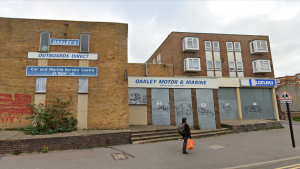A Brighton charity that recycles and reuses wood and helps marginalised people back into work has started a crowdfunding campaign to cover the cost of refitting its new premises.

The Brighton and Hove Wood Recycling Project, also known as the Wood Store, has already raised £3,000 towards its £15,000 goal.
The charity, funded 23 years ago, had to leave its former home in Elder Place, behind London Road, when the site was earmarked for housing.
The Wood Store has secured a new base, at Oakley House, in Edward Street, previously occupied by Oakley Motor and Marine.
Wood Store general manager Steve Bannatyne said: “The site is pretty much that – a site! We’ve begun to refit, with the help of some wonderful volunteers who are busy refurbishing, cleaning and painting.
“We have some 5,500 sq ft of space which will be all white with reclaimed scaffold. It’ll be cladded with a feature wall, timber racks and a fully reclaimed kitchen. All the doors are reclaimed – there’ll be no new wood in there at all.
“We are trying to raise £15,000 to cover the cost of refitting the new workshop. The workshop is where volunteers will be trained.
“These are people finding it difficult to get back into mainstream employment, are from socially isolated backgrounds or live with mental or physical illness or disability.
“All volunteers are expected to play an active role, helping others increase their skills and confidence too.
“They’ll learn a variety of skills, depending on their abilities and capabilities, from office admin to making furniture. In 2019 we trained 81 people.”
In the same year the Wood Store also rescued more than 830 tonnes from the waste stream and saved 414 tonnes of C02.
“We created 13.8 paid jobs and trained 81 people,” Mr Bannatyne said. “We reused 303.1 tonnes of wood. 36.5 per cent was pushed up the waste hierarchy into reuse – used by the community for DIY or building projects or as firewood or made into a whole range of beautiful products from bird boxes to dining tables.
“And 527.7 tonnes was recycled. 63.5 per cent was sent for recycling into woodchip, used in the manufacture of particleboard, animal bedding or as carbon-neutral fuel in power stations.
“With us, everything we collect is reused or recycled. Nothing is returned to the waste stream. Reusing wood is 10 times more efficient than harvesting, milling and transporting virgin wood.
“Even our collection methodology saves carbon. Our 3.5 tonne collection trucks use less than half the fuel of a skip lorry, greatly reducing CO2 emissions, pollution and the impact on the road.
“With every tonne of wood we collect, we are creating work and training opportunities for disadvantaged people, changing lives for the better.
“One of the things we do best is help trainees and volunteers – who’ve been marginalised from the workforce through mental health problems, homelessness, alcohol or drug-related issues – through training and mentoring.
“I’ve seen people come from the tail end of addiction, living in a halfway house, to fully rebuilding their lives free from past problems.
“Some go on to further education or return to a workforce after long-term isolation.
“We offer a secure, structured, non-judgmental environment with a friendly team to help get to the next stage.
“Simply having a daily structure with start and finish times, a cup of tea and lunch as a team can really boost confidence. It’s an essential part of rehabilitation and getting back into society without pressure.
“Many of our staff members were once marginalised and have gone on to build futures for themselves working with us and so have empathy, ready to support others.”
The Wood Store, started in 1998, said that its charitable aims were
- protecting the environment by conserving resources – collecting, recycling and reusing reclaimed waste wood, operating throughout East and West Sussex
- educating and promoting behavioural change – through both educational materials and the collection, reuse and sale of sustainably produced timber and timber products, all at greatly reduced costs to the public
- changing lives, relieving unemployment and social exclusion – by providing jobs, work placements, training, qualifications, mentoring and volunteering opportunities for local people.
…
“Our focus is on supporting those disadvantaged in the job market through any form of mental or physical disability, social exclusion or vulnerability.”









